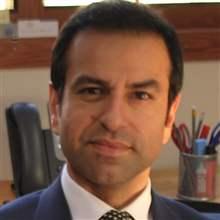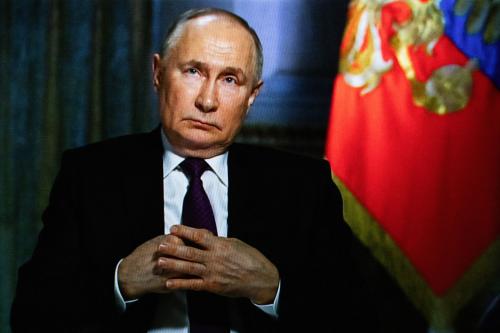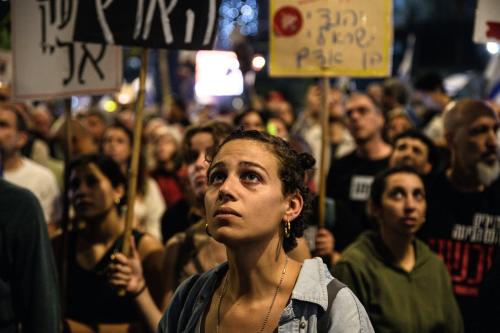Content from the Brookings Doha Center is now archived. In September 2021, after 14 years of impactful partnership, Brookings and the Brookings Doha Center announced that they were ending their affiliation. The Brookings Doha Center is now the Middle East Council on Global Affairs, a separate public policy institution based in Qatar.
As international pressure toward the escalating crisis Syria grows, Brookings experts held a candid conversation about U.S. foreign policy options for Syria, including the option of arming the rebels. Below is an edited transcript of these remarks from Bruce Riedel, Michael Doran, Daniel Byman and Salman Shaikh.
 Bruce Riedel
Bruce Riedel
Director, The Intelligence Project, Senior Fellow, Foreign Policy Program, Saban Center for Middle East Policy, Center for 21st Century Security and Intelligence
Little noticed in the media is that the congressional intelligence committees have rejected the administration’s plans to arm the opposition. And the opposition is bipartisan. The CIA has been told to come back with a better plan or it gets no funding. Without congressional approval and funding, no guns.
The only person who can bring some order and direction here is Susan Rice. Without a strong APNSA [national security adviser] with the support of the president, Syria policy will drift between the desire to stay out at all costs and the desire to do something.
In Afghanistan, it took 12 years to go from a policy of paying the ISI [Pakistan’s Directorate for Inter-Services Intelligence] to arming the rebels to paying the ISI to get the arms back from the rebels. In Syria, I doubt it will take 12 months.
 Michael Doran
Michael Doran
Senior Fellow, Foreign Policy Program, Saban Center for Middle East Policy
We’re going back to the 1920s—withdrawal inward.
I am worried about the lack of leadership—on both sides. Sen. McCain’s vision, which moves me personally, does not resonate in today’s political climate. We have no Reagan on the Republican side presenting a counter picture that forces Obama to play a greater leadership role.
I am not inclined to see the military as adamantly opposed to robust policy on Syria as some have suggested. The military would be less obstructionist if the president did not project a deep desire to stay away from Syria.
I am more concerned by attitudes on the Hill, particularly on the Republican side, where a kind of neo-isolationism is taking hold. Those of us who believe we must remain deeply engaged in this region have our work cut out for us.
One of the really striking things about this conflict— and one of the reasons I don’t shut up about it—is the drift toward American involvement. Consider this striking set of facts: here we have a president who very obviously does not want to do anything. And we also have a public opinion that is fully supportive of him. So bipartisan is public opinion on this issue that Sarah Palin and Andrew Sullivan actually agree about it. (There is only one other statement that the two of them agree on and it is this: bad people suck.) Add to this fact we have a military that on some level and for some reason shares Obama’s reservations. And yet despite all of that, the Secretary of State (John Kerry!) is arguing for military strikes against Assad. This mix of executive wariness combined with a drift toward American action is amazing to me.
My questions to the president would be: what’s his plan to prevent a jihadi haven in Syria, and how’s it going so far? And what’s his plan to get the hundreds of thousands of refugees out of Jordan and back into their homes in Syria?
 Daniel Byman
Daniel Byman
Senior Fellow, Foreign Policy Program, Director of Research, Saban Center for Middle East Policy
I’m on the side of Congress on this one.
As you all know, I’ve been pushing the “arm the opposition” approach for two years now, along with several of my esteemed colleagues. But there are two problems. First, it’s not two years ago, it’s now. A lot has happened in the interim that make the “arm the opposition” approach less likely to succeed. However, I still think it is worth trying for a variety of reasons, including having a horse in the game should Assad fall and Syria collapse into chaos. However, from what I can tell from leaks and press announcements, the Obama administration does not really have a coherent plan, and its approach risks becoming the worst of all worlds—putting U.S. prestige on the line and getting the U.S. mixed up in a confusing situation while not actually leading and putting enough resources in to change the situation on the ground fundamentally.
It looks like Congress is skeptical that the administration has a plan, understands potential contingencies, has organized the bureaucracies, and has made a case to the American people. I’m skeptical too.
I very much worry that in this case covert action, or “overt covert” as the old description goes, will become a substitute for policy. We will be doing something, but we’ll have no broader goals or framework. So our actions will become our policy and they’ll be unsupported politically and diplomatically—and have little support across most USG agencies.
 Salman Shaikh
Salman Shaikh
Director, Brookings Doha Center, Fellow, Foreign Policy Program, Saban Center for Middle East Policy
The Obama administration has no real joined strategy or vision (as Dan points out) for Syria. Mike is right of course in asking how it can ensure its painfully limited national security goals. The administration has to understand that you cannot contain the effects of the Syria crisis, you have to work to resolve it. In particular, containing regional spillover is becoming harder and harder by the day. Syria and its neighborhood are not only facing a devastating humanitarian catastrophe, but an alarming resurgence of civil strife and the growing threat of terrorism.
The administration’s apparent answer—to fortify Jordan by deploying extra U.S. troops and military hardware—while needed, will not protect Jordan from the asymmetrical terror threat of extremism, whether jihadist or that initiated by the Assad regime. Rising sectarian conflict and the effect of paralysed and broken political systems in Lebanon and Iraq will likely embroil rather than insulate both countries armed forces. To think that increased U.S. technical support and hardware to these institutions can save the day, as the administration is reportedly working on, is wishful thinking. In Lebanon today, there is another political storm brewing among its leaders, this time about the decision to extend the term of the General Khawiji, the chief of staff of the Lebanese Army. In Iraq, 1.045 civilians and security personnel were killed only in May—the highest monthly death toll in years. And there is no end in sight.
As the effects of this crises spiral out of control, it is likely that the Obama administration will have to get involved in the end, just in a much heavier (and potentially more damaging) way.


Commentary
Around the Halls: U.S. Foreign Policy and Syria
June 28, 2013